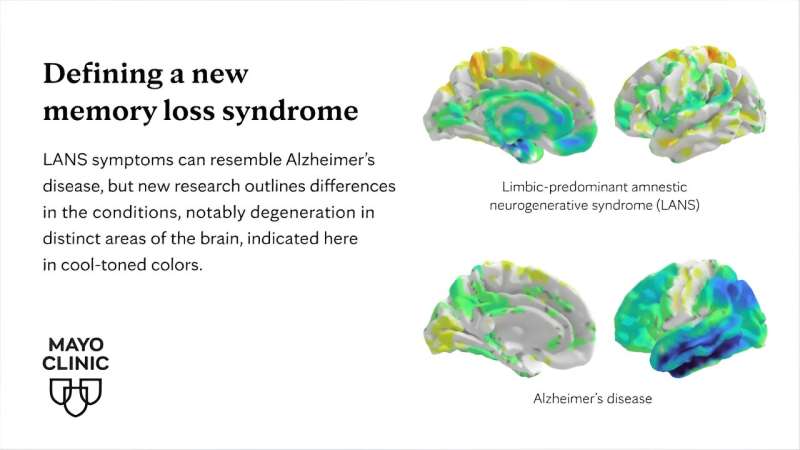Researchers at Mayo Clinic have established new criteria for a memory-loss syndrome in older adults that specifically impacts the brain’s limbic system. It can often be mistaken for Alzheimer’s disease. The good news: Limbic-predominant Amnestic Neurodegenerative Syndrome, or LANS, progresses more slowly and has a better prognosis, and is now more clearly defined for doctors working to find answers for memory loss patients.
Prior to the researchers developing their clinical criteria, now published in the journal Brain Communications, the hallmarks of the syndrome could be confirmed only by examining brain tissue after a person’s death.
The proposed criteria provide a framework for neurologists and other experts to classify the condition in patients living with symptoms, offering a more precise diagnosis and potential treatments. They consider factors such as age, severity of memory impairment, brain scans, and biomarkers indicating the deposits of specific proteins in the brain.
The criteria were developed and validated using data from more than 200 participants in databases for the Mayo Clinic Alzheimer’s Disease Research Center, the Mayo Clinic Study of Aging and the Alzheimer’s Disease Neuroimaging Initiative.
Understanding the condition will lead to better management of symptoms and more tailored therapies for patients suffering from this type of cognitive decline, distinct from Alzheimer’s disease, says David T. Jones, M.D., a Mayo Clinic neurologist and senior author of the study.

“In our clinical work, we see patients whose memory symptoms appear to mimic Alzheimer’s disease, but when you look at their brain imaging or biomarkers, it’s clear they don’t have Alzheimer’s. Until now, there has not been a specific medical diagnosis to point to, but now we can offer them some answers,” Jones says.
“This research creates a precise framework that other medical professionals can use to care for their patients. It has major implications for treatment decisions, including amyloid-lowering drugs and new clinical trials, and counseling on their prognosis, genetics and other factors.”
Decades of work to understand and classify different types of dementia is ongoing, says Nick Corriveau-Lecavalier, Ph.D., the paper’s first author. These findings build upon scientists’ continued efforts to untangle neurological conditions that often have similar symptoms or can occur simultaneously, but can have drastically different treatments and prognoses.
“Historically, you might see someone in their 80s with memory problems and think they may have Alzheimer’s disease, and that is often how it’s being thought of today,” Corriveau-Lecavalier says. “With this paper, we are describing a different syndrome that happens much later in life. Often, the symptoms are restricted to memory and will not progress to impact other cognitive domains, so the prognosis is better than with Alzheimer’s disease.”
Without signs of Alzheimer’s disease, the researchers looked at the involvement of one possible culprit—a buildup of a protein called TDP-43 in the limbic system that scientists have found in the autopsied brain tissue of older adults. Researchers have classified the build-up of these protein deposits as limbic-predominant age-related TDP-43 encephalopathy, or LATE. These protein deposits could be associated with the newly defined memory loss syndrome, but there are also other likely causes and more research is needed, the authors say.
With clinical criteria established by Jones, Corriveau-Lecavalier and co-authors, practitioners could soon diagnose LANS in patients so those living with memory loss might better understand options for treatment and potential progression of the disease, opening doors for research to further illuminate the characteristics of the disease.
More information:
Nick Corriveau-Lecavalier et al, Clinical criteria for a limbic-predominant amnestic neurodegenerative syndrome, Brain Communications (2024). DOI: 10.1093/braincomms/fcae183
Citation:
Scientists define new type of memory loss in older adults (2024, July 17)
retrieved 17 July 2024
from https://medicalxpress.com/news/2024-07-scientists-memory-loss-older-adults.html
This document is subject to copyright. Apart from any fair dealing for the purpose of private study or research, no
part may be reproduced without the written permission. The content is provided for information purposes only.

